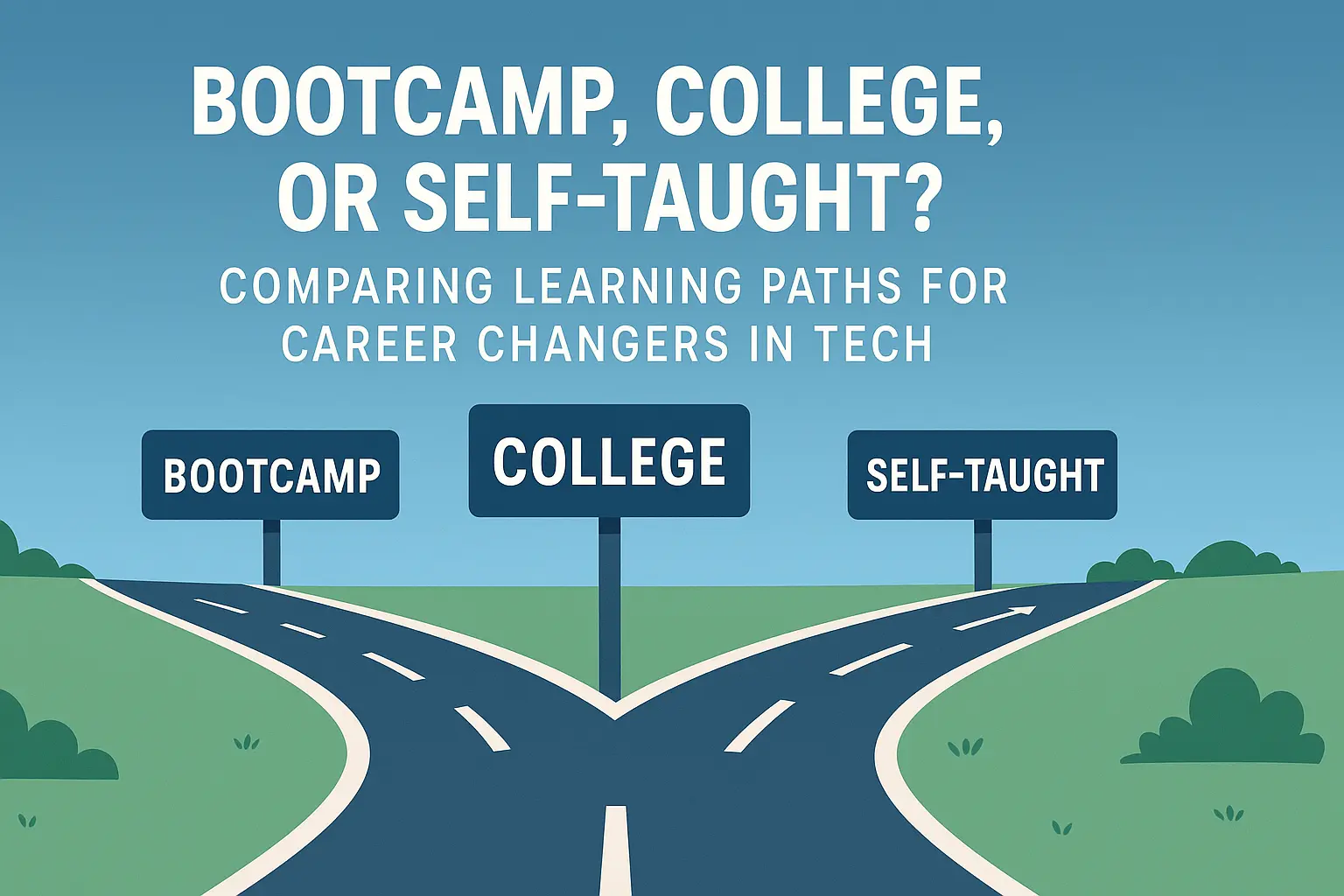
In an age where anyone with Wi-Fi can learn to code, the question for career changers isn’t just whether to enter tech—it’s how. Traditional four-year degrees, accelerated coding bootcamps, and self-taught learning each offer unique paths into the industry. But which one is right for you? This article breaks down the pros, cons, and career potential of coding bootcamps, college degrees, and the self-taught journey, helping you find the learning path that best aligns with your goals, lifestyle, and learning preferences. Read on to find out -Bootcamp, College or Self-Taught which Option will help you build a good tech career.
If you’re transitioning from teaching, hospitality, finance, retail—or anywhere else—into tech, the stakes feel high. You want to learn efficiently, affordably, and get hired in a competitive market. So, how do the options compare?
1. The College Degree Path
What It Looks Like
- Full-time, 2–4 years (Associate’s or Bachelor’s)
- CS, Software Engineering, Data Science, or Information Systems majors
- Campus-based, hybrid, or fully online formats
- Includes general education and theoretical coursework
Pros
- Deep technical foundation: Universities provide in-depth coverage of algorithms, data structures, operating systems, networks, and computational theory. This theoretical grounding is especially useful for building fundamentals for long-term growth and advanced roles like software architect or machine learning engineer.
- Employer recognition and visa support: Many employers still view CS degrees as the “gold standard,” especially for high-paying roles at Google, Microsoft, or Meta. It’s also essential for those needing sponsorship (e.g., international students applying for an H-1B).
- Access to internships and alumni networks: On-campus recruiting, tech clubs, hackathons, and career services provide structured ways to network and access internships or early-career roles.
- Graduate school pathway: A CS degree unlocks opportunities for advanced degrees (M.S., Ph.D.) in tech and adjacent fields.
Cons
- Time commitment: 2–4 years is a long runway, especially if you’re transitioning careers in your 30s or 40s. For parents, full-time workers, or those with financial constraints, this timeline can be daunting.
- High cost: U.S. college tuition ranges from $10k–$60k+ per year. While scholarships and financial aid exist, debt remains a barrier for many.
- Less practical experience: Unless students actively build side projects or pursue internships, they may graduate with minimal real-world coding skills.
Ideal for:
- Younger career changers with time to invest
- Those aiming for competitive or research-intensive roles
- International students seeking degree-based visas
- People who thrive in academic environments
2. The Bootcamp Route
What It Looks Like
- Full-time (9–24 weeks) or part-time (up to 9 months)
- Intense, project-based training in full-stack web development, data science, or DevOps
- Focus on industry tools, team collaboration, and job readiness
Pros
- Accelerated path to employability: Bootcamps focus on getting you job-ready fast. Students learn programming fundamentals, work in collaborative teams, and graduate with a portfolio of real-world projects.
- Industry-relevant tools: While CS programs may not teach Git, Docker, React, or AWS, bootcamps prioritize exactly these tools, ensuring you’re fluent in what employers use today.
- Career support and placement help: Job placement programs like SynergisticIT provide resume coaching, mock interviews, LinkedIn optimization, and recruiter connections and comprehensive marketing. Many support students until placement—not just graduation.
- Community and accountability: Unlike solo learning, bootcamps offer structured schedules, cohort camaraderie, mentor feedback, and live instruction—making it easier to stay motivated and consistent.
- Less time and lower cost than college: Many bootcamps cost between $10K–$20K and last under a year, delivering faster ROI than a four-year degree.
Cons
- Not all bootcamps are created equal: Quality varies widely. Some programs overpromise and underdeliver, with outdated curricula, limited support, or inflated job stats.
- Compressed learning can be overwhelming: Pacing is fast. Without discipline and time management, students may fall behind.
- Limited theoretical depth: While bootcamps teach how to build, they often skim concepts like algorithmic efficiency, systems design, and lower-level computing.
Ideal for:
- Career changers who want to enter tech in
- People motivated by structure, mentorship, and job support
- Learners seeking industry-ready skills, not just knowledge
- Professionals who thrive in immersive environments
3. The Self-Taught Path
What It Looks Like
- Choose your own curriculum via online courses (e.g., freeCodeCamp, Coursera, Udemy)
- Study at your own pace
- Build a portfolio from personal or freelance projects
- No formal credentials—but lots of autonomy
Pros
- Ultimate flexibility: Perfect for those juggling full-time work, parenting, or unpredictable schedules. You set your pace, study style, and specialization.
- Extremely low cost: Many world-class resources are free or under $100. With discipline, you can master web development or data analysis with zero tuition.
- Learn what you want: Customize your stack, focus area, or niche. Want to become a Python automation specialist or build indie game engines? Go for it.
- Develop self-sufficiency: You’ll get good at Googling errors, reading documentation, and troubleshooting—essential skills for any developer.
Cons
- Lack of structure and feedback: Without a clear curriculum, coach, or timeline, it’s easy to spin in circles. Many self-taught developers struggle to assess when they’re “job-ready.”
- Higher dropout risk: According to MIT and Harvard, MOOCs have a completion rate of less than 10%, highlighting a significant dropout risk for learners who may lack motivation, support, or structured guidance. Less time and lower cost than college: Many bootcamps cost between $10K–$20K and last under a year, delivering faster ROI than a four-year degree.
- No recognized credential: Some employers still filter for degrees or certifications, making it harder to stand out without a portfolio or referral.
- Gaps in soft skills: Self-taught devs may lack experience with code collaboration, version control, agile teams, or articulating technical decisions—skills often gained in bootcamps or formal programs.
Ideal for:
- Self-motivated learners with strong problem-solving skills
- Career changers who can’t commit to full-time study
- Tinkerers and hobbyists exploring tech as a passion
- Those testing the waters before committing to bootcamp or college
Which Path Is Right for You?
Let’s compare the three based on core factors:
| Factor | College | Bootcamp | Self-Taught |
| Time Commitment | 2–4 years full-time | 3–9 months | Flexible, open-ended |
| Cost | $40K–$150 K+ | $10K–$20K | $0–$1K |
| Flexibility | Low | Medium | High |
| Job Readiness | Medium (requires internships) | High (focused on placement) | Variable (depends on projects) |
| Theoretical Depth | High | Low–Medium | Low |
| Project Portfolio | Optional (depends on the student) | Required + coached | Required + self-driven |
| Mentorship & Support | Medium | High (mentors, job coaches) | Low (depends on the community) |
| Job Placement Help | Low–Medium | High (career services) | None (self-managed) |
| Recognition | Widely recognized | Bootcamp-dependent | Portfolio-dependent |
| Ideal For | Younger learners, deep technical interest | Career changers seeking a fast track | DIY learners, low budget |
What Employers Really Care About
Here’s a secret most job listings don’t tell you: employers don’t care how you learned—they care what you can do.
Whether you have a degree, bootcamp certificate, or are self-taught, most technical interviews assess:
- Your problem-solving approach
- Your understanding of tools and frameworks
- Your ability to communicate clearly and work with a team
- A GitHub portfolio or real-world experience that shows your work
That said, getting hired is harder when you’re missing:
- Credibility signals (like a degree or a recognized bootcamp)
- Soft skills and interview practice
- Resume alignment with job keywords and ATS systems
- Portfolio work with documented problem-solving
This is why many self-taught learners eventually join a bootcamp—and why even CS grads turn to bootcamps to learn cloud, DevOps, or deployment skills.
Choose the Path That Moves You Forward
Changing careers is never easy, but tech offers one of the most accessible and rewarding pivots out there. The key isn’t choosing the “best” path—it’s choosing the best path for you:
- Choose college if you’re early in life, need a visa, or want a deep academic foundation.
- Choose bootcamp if you’re ready to transition quickly, value structure and mentorship, and want a faster route to your first job.
- Choose self-taught if you’re deeply self-motivated, on a tight budget, and comfortable navigating ambiguity.
Or blend them. Many successful professionals start self-taught, attend a bootcamp, and supplement with MOOCs or university courses later on. There’s no wrong path—only momentum, effort, and support.
Ideal Path is to do a college degree and then do a bootcamp which gets you prepared for the real world.
And if you’re seeking a clear, guided, job-oriented path with mentorship, certifications, and real job placement help?
That’s where SynergisticIT delivers.
SynergisticIT: The Bridge Between Self-Taught Hustle and Real-World Hiring
For many career changers, a pure bootcamp or solo learning experience doesn’t cover it all. You need the skills of a developer, the polish of a professional, and the support of a career team. That’s where SynergisticIT stands apart.
It offers a hybrid model designed for those pivoting from non-tech fields—educators, analysts, logistics specialists, support staff, artists—anyone looking to make a focused, strategic leap into software development, data science, DevOps, or cloud engineering.
How SynergisticIT Sets You Up for Success:
- Curriculum Aligned to Career Outcomes: You won’t just learn how to code—you’ll build deployable APIs, dashboards, ML models, and pipelines that map directly to the job titles you’re applying for.
- Certifications That Open Doors: Whether it’s Java (Oracle), AWS, Spring Boot, Power BI, TensorFlow, or Kubernetes, SynergisticIT helps you earn credentials recruiters notice—and shows you how to integrate them into your story.
- Placement Support Until You Land a Role: From resume optimization and LinkedIn branding to recruiter outreach and interview prep, you’re not done when the course ends—you’re supported until you sign an offer.
- Flexible and Remote-Friendly: Career changers often balance families, jobs, and unique schedules. SynergisticIT offers a pathway that adapts to your life while maintaining momentum.
- Mentorship and 1-on-1 Support
Weekly mentorship ensures you’re never stuck alone. You get personalized feedback, interview coaching, code reviews, and encouragement when you need it most.
Final Word: Choose What Fits—Not What’s Trendy
Bootcamp, college, or self-taught—the best path is the one that keeps you learning, focused, and moving forward. Switching careers into tech is about momentum, not perfection. The first role is just the start, and every step you take compounds into deeper skills, better opportunities, and more confidence.
No matter where you’re coming from, you bring experience, perspective, and motivation that can’t be taught. When paired with structured training, real projects, certification, and career support, that’s an unbeatable combination.
And if you’re looking for a learning journey designed specifically for career changers—with modern skills, guided mentorship, and real job results—SynergisticIT may be your ideal launchpad.




